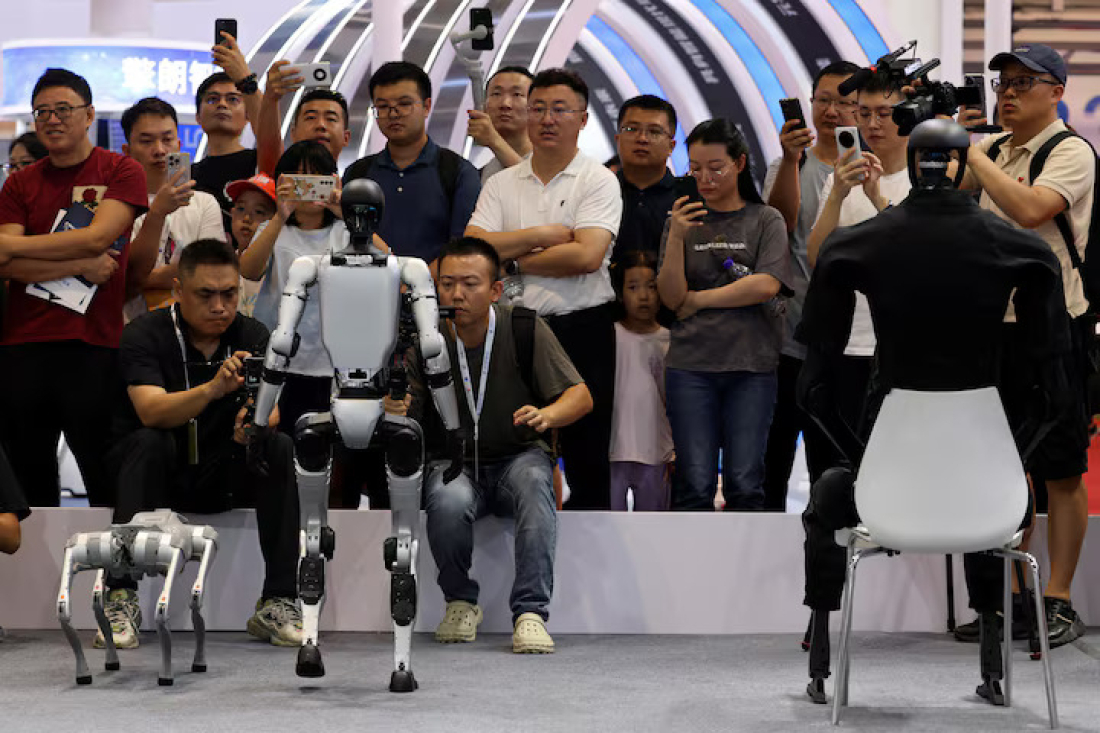Qarabağ FK host Newcastle in Champions League playoff tie
Qarabağ FK are facing Newcastle United in the UEFA Champions League play-off round on Wednesday evening in Baku, in what will be the first UEFA compe...
Despite its dominance in industrial robotics, China faces challenges in the race for humanoid robots due to its reliance on foreign technology and U.S. trade restrictions.
In January, Chinese President Xi Jinping convened top business leaders, including Huawei’s Ren Zhengfei and Alibaba’s Jack Ma, for a widely publicized meeting. Among them was Wang Xingxing, CEO of robotics startup Unitree Robotics, signaling China’s commitment to advancing its robotics sector within its $19 trillion economy.
China’s push for automation is driven by demographic shifts, including a shrinking workforce. Officials estimate a shortfall of nearly 30 million manufacturing workers by 2025, with projections indicating that by 2045, the workforce will decline to 645 million—well below its 2013 peak of 794 million. With an export-dependent economy, these trends threaten President Xi’s goal of doubling per capita GDP by 2035.
Chinese firms like BYD and Xiaomi are rapidly automating production lines, and the country leads in industrial robot installations. However, much of its robotics sector remains focused on low-tech applications such as welding and assembly, a market dominated by Japan, Germany, and Switzerland. Advances in artificial intelligence and hardware are now accelerating efforts to develop more sophisticated humanoid robots capable of functioning in diverse environments.
Analysts predict a surge in humanoid robot adoption, with Bank of America estimating annual global shipments will reach one million units by 2030, creating a $20 billion market. While Tesla and Nvidia are making strides in the U.S., Chinese companies like Unitree and UBTech Robotics are gaining ground. Unitree launched an affordable humanoid model for under $20,000, while UBTech’s Walker bots are already working alongside humans in car factories.
China benefits from its leadership in electric vehicles (EVs), where synergies in battery, sensor, and vision system technology aid robotics development. Companies such as Xpeng are leveraging their expertise in EVs to expand into humanoid robotics. However, China remains dependent on foreign suppliers for critical components like reducers, essential for motor speed control. Local firms like Leaderdrive are catching up, but technological gaps persist.
One of the biggest obstacles China faces is its reliance on U.S. technology for AI and semiconductor components. Unitree, for instance, depends on Nvidia chips, leaving it vulnerable to potential U.S. export restrictions. Given the military applications of advanced robotics, U.S. lawmakers have already raised concerns about Chinese developments, warning that they could pose a future security threat.
Despite rapid progress and strong government support, China’s robotics industry faces an uncertain future. While it has made strides in mass-producing industrial and humanoid robots, its dependence on U.S. technology and the risk of geopolitical trade restrictions could hinder its ambitions to lead the global robotics race.

Cuba’s fuel crisis has turned into a waste crisis, with rubbish piling up on most street corners in Havana as many collection trucks lack enough petrol to operate.
Ruben Vardanyan has been sentenced to 20 years in prison by the Baku Military Court after being found guilty of a series of offences including war crimes, terrorism and crimes against humanity.
Canadian Prime Minister, Mark Carney, announced on 16 February that the Honourable Janice Charette has been appointed as the next Chief Trade Negotiator to the United States. She's been tasked with overseeing the upcoming review of the Canada-United States-Mexico Agreement (CUSMA).
The Pentagon has threatened to designate artificial intelligence firm Anthropic as a “supply chain risk” amid a dispute over the military use of its Claude AI model, according to a report published Monday.
Israeli airstrikes on southern Lebanon killed two people in 12 hours, Lebanon’s Health Ministry said on Tuesday.
ByteDance will take steps to prevent the unauthorised use of intellectual property on its artificial intelligence (AI) video generator Seedance 2.0, the Chinese technology firm said on Monday.
The formation of a black hole can be quite a violent event, with a massive dying star blowing up and some of its remnants collapsing to form an exceptionally dense object with gravity so strong not even light can escape.
BMW is recalling a mid six figure number of vehicles worldwide after identifying a potential fire risk linked to the starter motor.
British chipmaker Fractile will invest £100 million over the next three years to expand its artificial intelligence hardware operations in the UK, opening a new engineering facility in Bristol as it ramps up production of next-generation AI systems.
The European Union has launched its largest semiconductor pilot line under the European Chips Act, investing €700 million ($832 million) in the new NanoIC facility at IMEC in Leuven, Belgium, as part of efforts to strengthen Europe’s technological sovereignty.
You can download the AnewZ application from Play Store and the App Store.

What is your opinion on this topic?
Leave the first comment